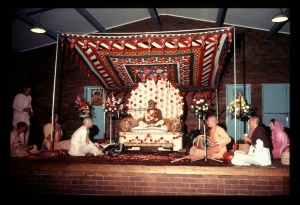SB 1.7.9: Difference between revisions
Visnu Murti (talk | contribs) No edit summary |
No edit summary |
||
| Line 1: | Line 1: | ||
{{info | {{info | ||
|speaker= | |speaker=Śaunaka Ṛṣi | ||
|listener= | |listener=Sūta Gosvāmī | ||
}} | }} | ||
[[Category:Srimad-Bhagavatam - Canto 01 Chapter 07|S09]] | |||
[[Category:Bhagavatam Verses Spoken by Saunaka Rsi - Vanisource|010709]] | |||
<div style="float:left">'''[[Srimad-Bhagavatam]] - [[SB 1|First Canto]] - [[SB 1.7: The Son of Drona Punished|Chapter 7: The Son of Droṇa Punished]]'''</div> | |||
<div style="float:right">[[File:Go-previous.png|link=SB 1.7.8]] '''[[SB 1.7.8]] - [[SB 1.7.10]]''' [[File:Go-next.png|link=SB 1.7.10]]</div> | |||
{{CompareVersions|SB|1.7.9|SB 1964|SB 1972-77}} | |||
{{RandomImage}} | |||
==== TEXT 9 ==== | ==== TEXT 9 ==== | ||
<div | <div class="verse"> | ||
śaunaka uvāca | :śaunaka uvāca | ||
sa vai nivṛtti-nirataḥ | :sa vai nivṛtti-nirataḥ | ||
sarvatropekṣako muniḥ | :sarvatropekṣako muniḥ | ||
kasya vā bṛhatīm etām | :kasya vā bṛhatīm etām | ||
ātmārāmaḥ samabhyasat | :ātmārāmaḥ samabhyasat | ||
</div> | </div> | ||
| Line 18: | Line 24: | ||
==== SYNONYMS ==== | ==== SYNONYMS ==== | ||
<div | <div class="synonyms"> | ||
śaunakaḥ | ''śaunakaḥ uvāca''—Śrī Śaunaka asked; ''saḥ''—he; ''vai''—of course; ''nivṛtti''—on the path of self-realization; ''nirataḥ''—always engaged; ''sarvatra''—in every respect; ''upekṣakaḥ''—indifferent; ''muniḥ''—sage; ''kasya''—for what reason; ''vā''—or; ''bṛhatīm''—vast; ''etām''—this; ''ātma-ārāmaḥ''—one who is pleased in himself; ''samabhyasat''—undergo the studies. | ||
</div> | </div> | ||
| Line 25: | Line 31: | ||
==== TRANSLATION ==== | ==== TRANSLATION ==== | ||
<div | <div class="translation"> | ||
Śrī Śaunaka asked Sūta Gosvāmī: Śrī Śukadeva Gosvāmī was already on the path of self-realization, and thus he was pleased with his own self. So why did he take the trouble to undergo the study of such a vast literature? | Śrī Śaunaka asked Sūta Gosvāmī: Śrī Śukadeva Gosvāmī was already on the path of self-realization, and thus he was pleased with his own self. So why did he take the trouble to undergo the study of such a vast literature? | ||
</div> | </div> | ||
| Line 32: | Line 38: | ||
==== PURPORT ==== | ==== PURPORT ==== | ||
<div | <div class="purport"> | ||
For the people in general the highest perfection of life is to cease from material activities and be fixed on the path of self-realization. Those who take pleasure in sense enjoyment, or those who are fixed in material bodily welfare work, are called karmīs. Out of thousands and millions of such karmīs, one may become an ātmārāma by self-realization. Ātmā means self, and ārāma means to take pleasure. Everyone is searching after the highest pleasure, but the standard of pleasure of one may be different from the standard of another. Therefore, the standard of pleasure enjoyed by the karmīs is different from that of the ātmārāmas. The ātmārāmas are completely indifferent to material enjoyment in every respect. Śrīla Śukadeva Gosvāmī had already attained that stage, and still he was attracted to undergo the trouble of studying the great Bhāgavatam literature. This means that Śrīmad-Bhāgavatam is a postgraduate study even for the ātmārāmas, who have surpassed all the studies of Vedic knowledge. | For the people in general the highest perfection of life is to cease from material activities and be fixed on the path of self-realization. Those who take pleasure in sense enjoyment, or those who are fixed in material bodily welfare work, are called ''karmīs''. Out of thousands and millions of such ''karmīs'', one may become an ''ātmārāma'' by self-realization. ''Ātmā'' means self, and ''ārāma'' means to take pleasure. Everyone is searching after the highest pleasure, but the standard of pleasure of one may be different from the standard of another. Therefore, the standard of pleasure enjoyed by the ''karmīs'' is different from that of the ''ātmārāmas''. The ''ātmārāmas'' are completely indifferent to material enjoyment in every respect. Śrīla Śukadeva Gosvāmī had already attained that stage, and still he was attracted to undergo the trouble of studying the great [[Srimad Bhagavatam|''Bhāgavatam'']] literature. This means that [[Srimad Bhagavatam|''Śrīmad-Bhāgavatam'']] is a postgraduate study even for the ''ātmārāmas'', who have surpassed all the studies of Vedic knowledge. | ||
</div> | </div> | ||
__NOTOC__ | |||
<div style="float:right; clear:both;">[[File:Go-previous.png|link=SB 1.7.8]] '''[[SB 1.7.8]] - [[SB 1.7.10]]''' [[File:Go-next.png|link=SB 1.7.10]]</div> | |||
__NOTOC__ | |||
__NOEDITSECTION__ | |||
Revision as of 10:29, 30 April 2021

A.C. Bhaktivedanta Swami Prabhupada
TEXT 9
- śaunaka uvāca
- sa vai nivṛtti-nirataḥ
- sarvatropekṣako muniḥ
- kasya vā bṛhatīm etām
- ātmārāmaḥ samabhyasat
SYNONYMS
śaunakaḥ uvāca—Śrī Śaunaka asked; saḥ—he; vai—of course; nivṛtti—on the path of self-realization; nirataḥ—always engaged; sarvatra—in every respect; upekṣakaḥ—indifferent; muniḥ—sage; kasya—for what reason; vā—or; bṛhatīm—vast; etām—this; ātma-ārāmaḥ—one who is pleased in himself; samabhyasat—undergo the studies.
TRANSLATION
Śrī Śaunaka asked Sūta Gosvāmī: Śrī Śukadeva Gosvāmī was already on the path of self-realization, and thus he was pleased with his own self. So why did he take the trouble to undergo the study of such a vast literature?
PURPORT
For the people in general the highest perfection of life is to cease from material activities and be fixed on the path of self-realization. Those who take pleasure in sense enjoyment, or those who are fixed in material bodily welfare work, are called karmīs. Out of thousands and millions of such karmīs, one may become an ātmārāma by self-realization. Ātmā means self, and ārāma means to take pleasure. Everyone is searching after the highest pleasure, but the standard of pleasure of one may be different from the standard of another. Therefore, the standard of pleasure enjoyed by the karmīs is different from that of the ātmārāmas. The ātmārāmas are completely indifferent to material enjoyment in every respect. Śrīla Śukadeva Gosvāmī had already attained that stage, and still he was attracted to undergo the trouble of studying the great Bhāgavatam literature. This means that Śrīmad-Bhāgavatam is a postgraduate study even for the ātmārāmas, who have surpassed all the studies of Vedic knowledge.